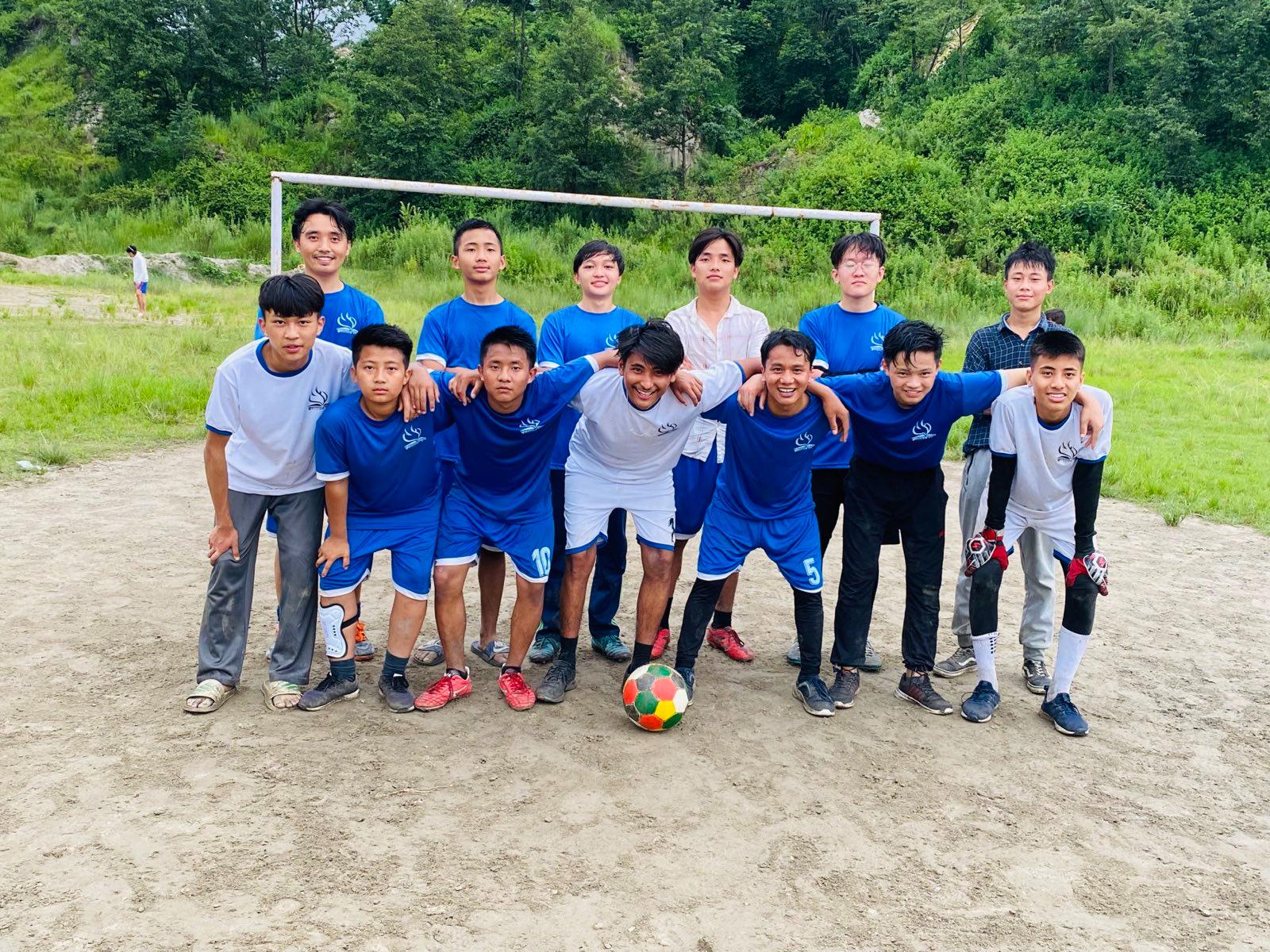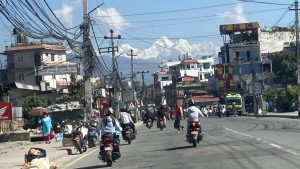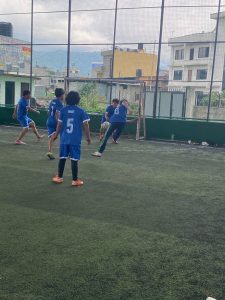On a sweltering monsoon morning, the weekly worship service has just finished at the New Community Church of the Nazarene in Kathmandu. As the adults chat on the way to the exits, 36 teenagers spill into the tin-roofed hall. Most Christians in Nepal belong to the younger generation, which is a notable contrast to the average age of Christians in the West. But seeing many teens in a small congregation is
striking, especially as several come from non-Christian households. They’ve been brought here by Agape.
Agape is led by 22-year-old Rohit Magar, who also teaches at a nearby school. After a rousing guitar chorus, he reminds everyone that tomorrow is the group’s 10th anniversary. Agape was initially organized by Rohit and a few of his 12-to-15-year-old friends for fellowship and sports. The group would regularly chip in some rupees (Nepal’s currency) to pay the hourly rate for a match at an indoor soccer court that was one of the only sporting spaces in the dense urban sprawl around Tikathali, the church’s neighborhood.
However, that principle of raising common funds soon spread beyond futsal (indoor football) money. “If someone in the group lacks something, we collect and give,” explains Devna*, an upcoming young Agape leader.
In Tikathali, as in most of Kathmandu, middle-class families live elbow-to-elbow with neighbors who are landless and have no dependable jobs. School brings children in those families together—and now, so does Agape.
The teenagers chip in to help each other, ensuring none of them is without the essentials, especially school uniforms and supplies and timely payment of school fees. If someone gets sick, the rest will go to their house, pray for them, and provide other help as needed.
They also make sure no one is left out of the fun: swimming, Bible study, quizzing, music practice, trips out to green spaces, and picnics of home-cooked food taken up onto the Himalayan hillsides that tower above the smog of Tikathali.
“In our school, if there’s a trip, then ‘no money, no go.’ But that’s not the way in Agape,” grins 15-year- old Alina*. The principle of leaving no one out attracts youth from all around the neighborhood, as does Agape’s spirit of generosity. Today Rohit reminds everyone that Bibek*, one group member, just passed his Class 8 exams with distinction, and they agreed to buy him a calculator to celebrate.
The costs of mutual support, fellowship, and fun sometimes go beyond what the teenagers alone are able to raise. Behind where the Agape teens are meeting this morning, four members of the New Community Church of the Nazarene count the weekly offering money from the just-finished service. Some of those rupees will go to support this youth ministry. The church is fully committed to supporting Agape and its young leaders.
Ganga Mukhiya, Nepal’s district superintendent, is New Community’s primary pastor; he planted it 15 years ago. In a culture where topmost leaders can be expected to exert close control, he stands out for the freedom and encouragement he gives younger congregation leaders. That includes Rohit, whom Ganga met many years ago. Over the years, Ganga has provided support and mentoring to Rohit, both while launching Agape and in its continued growth.
“So many of these youth don’t connect with their parents, teachers, or the older generation of believers,” Ganga reflects. “But they do connect with each other. Agape gives them opportunities that no one else in their lives will support, and we want to support that as a church.” The teenagers of Tikathali have grown up in a churn of social change. They were born during or immediately after a decade-long civil war between the Nepali government and Maoist rebels, which sent hundreds of thousands fleeing to the relative safety and economic opportunity of the Kathmandu Valley.
Before the conflict, the capital’s outer reaches were still primarily green fields, and its inner neighborhoods were full of houses with gardens; now, like Tikathali, most of the valley is a sea of concrete buildings spilling into every available gap. Millions of Nepalis migrated abroad for work, building World Cup stadiums in Qatar, working in factories in Malaysia, or providing security services in fraught contexts like in Afghanistan.
War and migration frayed Nepal’s previously strong social fabric. In Kathmandu, many households now live in isolation from grandparents, cousins, and even people who speak the same local language, because Nepal has over 120 recognized languages. The nuclear family model, consisting of only parents and children, can feel like it is lacking in true community to people who grew up in rich networks of extended family, village, and ethnic groups that were all interconnected. Alcoholism, addiction, school dropout, and other symptoms of despair are
ever-present. Teenagers inhabit a social world that their parents struggle to understand, in part because everyone’s world has changed so much, so fast.
The Nazarene church in Nepal, in partnership with NCM, offers care and support beyond the traditional networks of family and ethnicity. Agape is a shining example of the difference it can make for a particularly hard-hit age group. The youth of Tikathali encourage each other to stay in school, do their homework, avoid smoking or drinking, and get along better with each other and their parents. When asked what they love about Agape, the immediate response is “unity”—something that is in short supply elsewhere in their lives.
Madan Shrestha, a 23-year-old Agape graduate, is one of the seven original founding members along with Rohit. Madan remembers that his non-Christian parents were happy for him to stick with the group because they saw him improving his habits and behavior, including the support he got to stay in school until graduation. Today, Madan is studying management while working part-time as an electrician. He and his mother have both become church members, and he has confidence and joy that would never have been part of his life without Agape.
“When I started Agape as a 12-year-old, my intent was just to play football,” Rohit laughs. “But it’s grown more and given me more than I could have imagined.”
*Names are changed for minors
-shared from NCM Magazine.







